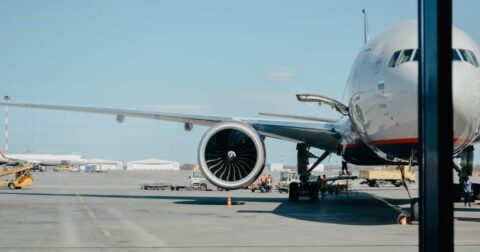News
Tech to End Chick Culling Has Now Been Implemented, but Challenges Remain
Breakthroughs•3 min read
Feature
A long-tailed macaque is flying through the air. Sadly, he is not leaping between trees. Like so many others, he is in the cargo hold of an airplane on his way to an animal experimentation facility.


Words by Claire Hamlett
A long-tailed macaque is flying through the air. Sadly, he is not leaping between trees in the wild but is in a box in the cargo hold of an airplane. When he arrives at his destination, he will be sent to a research lab where he will be restrained and, in all likelihood, force-fed or injected with drugs or chemicals to see what they do to him.
He isn’t alone in the cargo bay; there are other monkeys, possibly beagles, rabbits, and rats—some of the animals most commonly imported for use in British laboratories. And now, animal advocates are targeting one of the industries that enables animal experimentation: aviation.
“Like other notorious trades in lives that have gone before it, animal testing relies on the complicity of transportation interests—in this case, airlines, airports, haulage firms, and insurance companies—to keep the wheels turning,” says Jane Smith, the UK’s first Animal Welfare Party councilor and organizer of a recent protest and petition to get Manchester Airport to stop accepting imports of lab-bound animals on Air France flights. The campaign follows in the footsteps of groups including Peta and Cruelty Free International, animal protection organizations that have long pressured airlines to refuse lab animal cargo.
“In our demo outside Manchester Airport, we aimed to challenge animal testing and its orbital industries, to call out Manchester Airports Group for its role in this horrific trade, and to demand that human progress not be at the cost of other species,” says Smith.
Manchester Airport and Heathrow Airport in London are the two airports in the UK that accept animal cargo flights from Air France. The peaceful protest held at Manchester Airport on World Day for Laboratory Animals, April 24th, drew around 40 people holding signs with messages such as “MCR Airport = Gateway to Hell” and, according to Smith, attracted “a lot of noisy support from passing drivers.” Manchester Airport did not respond. When the petition reaches 500 signatures, it will be delivered in person and via social media.
The orthodox view in medical research is that using animals as test subjects is essential for developing drugs such as those used in cancer treatments. There is also pressure on researchers to use animals because it is a legal requirement in some countries including the UK and the U.S. to test new medicines and other products on animals before they are tested on humans. But a number of scientists have argued that animal testing is less reliable than the science shows, with limited benefits for humans beings. More than 90 percent of drugs that pass preclinical tests fail to reach the market, mainly due to safety issues and ineffectiveness that weren’t predicted by animal trials.
This leaves airlines and airports on shaky moral ground if they seek to justify their role in enabling animal experimentation on the basis of its necessity or effectiveness. But lab animals are not the only ones that airlines help to move around the world, and in other cases, the injustice is even more clear cut. The exotic pet trade, zoos, and horse racing all benefit from the support of the aviation industry. Animals destined to be slaughtered for their meat are also frequently shipped around the globe by air. “To properly reveal the nature of these cruel trades which are very lucrative for a select few individuals or corporations, it’s important that we show the workings of those industries—including how animals are transported, insured, and so on,” says Smith.
Every year, hundreds of horses, some of which are ex-racehorses, former carriage horses, or unwanted pets, suffer long-haul flights from Canada to Japan where they will become food for the wealthy. Australia exports thousands of sheep, goats, buffalo, and cattle by air annually. Ireland is now considering using airplanes to export unweaned male calves—the surplus of its expanding dairy industry. While this move is aimed at cutting down on grueling journey times the calves have to endure, campaigners warn that the flights will still be “horrific” for the calves.
Flying is indeed often a stressful experience for animals and can be dangerous and even fatal, meaning that airlines that fly animals used in these industries and the airports that accept the cargo are contributing in a more direct sense to animal suffering.
The complicity of the aviation industry in unjust practices doesn’t even stop with animals. Airlines including British Airways (BA) and EasyJet have enabled the cruel deportation regime of the UK Home Office. Among the thousands of people deported from the UK every year are refugees fleeing persecution and hardship and people classed as illegal immigrants, even if they have been in Britain since birth. In 2018 it was revealed that up to 160 people from the Windrush Generation may have been wrongfully deported from the UK, some of which may have been put on Virgin Airlines and BA flights.
But airlines can choose not to participate in these practices. Indeed, following the Windrush scandal, Virgin Airlines said it would no longer help the Home Office in deporting people deemed to be illegal immigrants. Similarly, airlines and airports could choose to stop transporting animals bound for labs, slaughter, or other forms of captivity and exploitation, and there is in fact a long list of airlines that won’t fly monkeys that will be used in experiments. In 2005, BA imposed a blanket ban on carrying lab animals, followed by United Airlines in 2013, China Southern Airlines in 2014, and Qatar Airways. But these airlines continue to fly other animals involved in less controversial industries, including those bound for zoos and used in racing.
Those that take a stance on such issues may find themselves under fire from the industries that use those animals. The four airlines that won’t carry lab animals face legal action after the U.S. National Association for Biomedical Research, a non-profit organization representing animal researchers, filed a complaint against them with the US Department of Transport in 2018. Major corporate clients including GlaxoSmithKline and AstraZeneca complained to BA at the time of its initial decision for hindering “vital and necessary medical research.” Such bans by airlines are not necessarily a clear victory for animal rights either, as some of those animals simply end up enduring longer journeys by other means including by road.
Many animal advocates are clear about the solution: we need to move away from using animals for research and for other human ends. “Animal rights isn’t an argument that can be won through a cost-benefit analysis,” says Smith. “The lives and freedom of animals can never be a ‘necessary’ cost of human health or scientific advancement. We have to keep bringing the debate back to a moral one.”